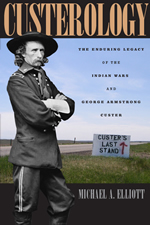Custer’s Last Stand

Michael A. Elliott’s new book, Custerology: The Enduring Legacy of the Indian Wars and George Armstrong Custer is a thought provoking exploration of the contemporary fascination with the Battle of Little Bighorn. From battle reenactments to the unfinished Crazy Horse memorial, for over a century the battle has captivated the American consciousness as one of the most significant defeats in U. S. military history. In a review published in last Sunday’s Access Atlanta Steve Weinberg takes note of Elliott’s book for its in-depth exploration of this phenomena. Weinberg writes:
Given all the military battles to study in world history, why does Little Bighorn, an 1876 military debacle in rural Montana, in which George Armstrong Custer, who commanded the Seventh Cavalry, lost his life along with about 200 soldiers, continue to fascinate more than 130 years later?… As Elliott phrases the matter in the absorbing Custerology: The Enduring Legacy of the Indian Wars and George Armstrong Custer, Custer’s death “has allowed non-Indian Americans to commemorate the defeat of the Seventh Cavalry as a glorious sacrifice for more than a century while at the same time giving Plains Indians the opportunity to extol a brave history of anti-colonial resistance.”
The review continues:
The author is an approachable guide as he takes readers to battlefields where Custer fought American Indians, such as an 1868 foray into a Cheyenne and Arapaho village on the Washita River; to the Michigan town of Monroe that Custer called home after he moved there at age 10 with his married half-sister to achieve schooling better than what was available in his Ohio birthplace; to the Black Hills of South Dakota where Custer led an expedition that gave birth to a gold rush.
Read an excerpt from the book.